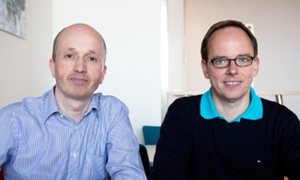15 March 2018
b) Theater or cinema? : Cinema
c) Dine out or dine in? : Dine in
d) Ferrari or Fiat? : Fiat
e) Shopaholic or chocoholic? : Chocoholic
f) Culture or Nature : Nature
 My name is Paola de Haas, I am Dutch and I am a PhD candidate in the department of Cell Biology in the theme Nanomedicine.
My name is Paola de Haas, I am Dutch and I am a PhD candidate in the department of Cell Biology in the theme Nanomedicine.
When you were a kid what did you want to be when you grew up? Can you tell us something about your child years.
When I was a kid I wanted to be all kinds of different things when I grew up. When I was very little I wanted to become a mailman, because I thought that I would always know the way and never get lost. Later on it changed into a vet because I would really enjoy working with animals. Then at some point I changed the animals for humans and I wanted to become a medical doctor. This idea stuck with me until I started studying Medical Biology and I realized a career in research suited me much better.What was your previous academic training, where did you study and why that study?
I studied Medical Biology at the Radboud University. Biology was always my favourite subject, I was interested in the way things worked. Even though I also really enjoyed plant and animal related courses, my main interests were still related to the human body in health and disease.The RIMLS motto is “Today’s molecules for tomorrow’s medicine”. What does this mean for you?
The research I do is quite strongly related to patients and is aimed at trying to understand the molecular basis of their disease and symptoms. I am studying a subtype of the congenital disorders of glycosylation (CDG) in which patients have an impaired N-glycosylation. I think in this study molecules can not only help to gain knowledge about the disease but in addition looking at the patient phenotype can help us understand something about the role of molecules, N-glycans in my case.Who is your great example as scientists? And please give a motivation why.
That is a difficult one! I think I would choose Jonas Salk, who developed the first successful vaccine against polio. He volunteered himself to take part in the clinical trial to test the vaccine. When the vaccine became available for everyone he did not patent it because he thought it belonged to the people. I think that shows real dedication and passion for an important goal in science, to improve healthcare.Which research discovery that you have made has made you most proud?
I haven’t made any big discoveries so far, so I will safe this question for later in my PhD.Given unlimited finance what experiment would you perform?
In the disease I am studying not only the amount of money but also the availability of patient material is limiting. Therefore I would want to invest in optimizing protocols to differentiate patient derived induced pluripotent stem cells to the different cell types which play a role in CDG and in developing organoids and organ-on-a-chip models to study tissues that are hard to gain access to, such as brain and heartWhat does your working area (desk, office) look like and what does it say about you (or your research)?
It varies a lot. When I am very busy, running from one experiment to another, it can get a bit messy. Then at some point the mess starts to annoy me and I will tidy everything up at once.Nominate a colleague to be in the spotlight and what would you like to ask him or her?
I would like to nominate Marieke Willemse and I would like to ask her what her favourite cell type is to look at under the microscope.What type of person are you, quick insights:
a) Mac or PC? : PCb) Theater or cinema? : Cinema
c) Dine out or dine in? : Dine in
d) Ferrari or Fiat? : Fiat
e) Shopaholic or chocoholic? : Chocoholic
f) Culture or Nature : Nature
Related news items

Prinses Beatrix Spierfonds grant to investigate patient stratification in myotonic dystrophy
24 January 2020 RIMLS researchers Rick Wansink and Roland Brock, both theme Nanomedicine, received a € 280,000 grant from the Prinses Beatrix Spierfonds. go to page
'Stofwisselkracht' grant for Paola de Haas and Alessandra Cambi
5 December 2019 Paola de Haas and Alessandra Cambi, theme Nanomedicine, have recently been awarded a grant from ‘Stichting Stofwisselkracht’ for their project entitled “Identification of immune-related symptoms in Congenital Disorders of Glycosylation”. go to page
Podosome nanoscale architecture redefined
20 November 2019 Koen van den Dries and Alessandra Cambi, theme Nanomedicine, revealed how the nanoscale architecture of podosomes enables dendritic cells to protrude and sense their extracellular environment. They have published their results in Nature Communications. go to page
A personal touch of Lise Ripken
3 October 2019 In order to promote interaction amongst colleagues within RIMLS, we have a ‘personal touch’ series setting employees in the spotlight. A light-hearted manner to learn about the colleagues you know and those you don’t. This week: Lise Ripken. go to page
MMD Lecturer of the year award for Alessandra Cambi
16 September 2019 At their annual MMD symposium, Alessandra Cambi, theme Nanomedicine, was chosen as lecturer of the year 2018-2019 of the Top Master "Molecular mechanisms of disease". go to page
